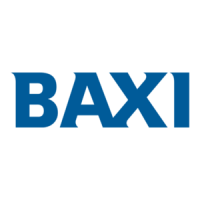
Do you have a question about the Baxi Neta-tec Combi 28 GA and is the answer not in the manual?
Details the process for installers using self-certification schemes for building regulations compliance.
Explains the process for notifying Local Authority Building Control departments for compliance.
Critical instructions for safe and compliant installation, commissioning, service, and repair of the appliance.
Lists relevant British and Irish codes of practice for gas and heating system installations.
Provides general advice and responsibilities for safe handling and lifting of the boiler.
Outlines necessary preparation steps to ensure safe handling and minimize risks during movement.
Details safe techniques for lifting and handling the boiler to prevent injury.
Key reminders and advice on assessing risks and stopping if injury is felt during handling.
Provides a description of the Baxi Neta-tec Combi GA Range boilers and their capabilities.
Mentions availability of optional accessories like timers and external controls for the boiler.
Lists the items included within the boiler's packaging, such as the boiler unit and literature.
Details the internal layout and identifies key components of the boiler with a diagram.
Explains how the boiler operates to provide central heating, including pump overrun and anti-cycling.
Describes the operation for domestic hot water, highlighting priority and the diverter valve function.
Details the boiler's integral frost protection mode and its activation conditions.
Explains the automatic pump operation for protection against sticking during inactivity.
Presents comprehensive technical specifications, including heat outputs, pressures, dimensions, and electrical data.
Provides detailed dimensions and clearance requirements for boiler installation with diagrams.
Shows the layout and sizes for pipe connections on the wall plate for installation.
Provides information regarding water byelaws compliance and relevant IRN notes for system installation.
Details the importance of system flushing and water treatment to prevent corrosion and maintain warranty.
Explains the boiler's integral automatic bypass and when an external bypass might be needed.
Discusses the necessity of external controls for optimizing boiler operation and energy efficiency.
Details the procedure for filling and pressurising the central heating system correctly.
Describes the boiler's pre-charged expansion vessel and its capacity limits.
Explains the function, setting, and discharge pipe requirements for the safety pressure relief valve.
Details the domestic hot water circuit, including connections, regulations, and potential issues.
Provides recommendations for shower controls to ensure user comfort and safety with the boiler.
Advises on suitable water treatment devices for installations in hard water areas.
Specifies suitable locations for fitting the boiler, considering flue discharge and building type.
Details the minimum clearances required around the boiler for installation, servicing, and air movement.
Addresses ventilation requirements when the appliance is installed within a cupboard or compartment.
Outlines the requirements for the gas supply installation, including relevant standards and pipe connections.
Details the electrical supply requirements, including earthing, polarity, and isolation methods.
Provides guidance on siting the boiler in rooms containing baths or showers, referring to zone regulations.
Explains the critical requirements for installing the condensate discharge pipework to prevent blockages and lockouts.
Continues detailing condensate drain termination methods, including connections to drains, gullies, and soakaways.
Further elaborates on condensate discharge, including pumped systems, trace heating, and avoiding back-pressure.
Provides general guidelines for siting flue terminals, considering plume dispersal and proximity to building features.
Details the standard horizontal flue system, including engagement, permissible lengths, and support requirements.
Specifies the maximum permissible equivalent flue lengths for various horizontal and vertical configurations.
Describes the application of flexible flue trims on the inner and outer faces of the wall.
Explains the use and positioning of terminal guards when dictated by codes of practice.
Details how to fit and angle the flue deflector for optimal plume deflection.
Refers to the Flue Installation Guide for comprehensive details on flue accessories like elbows and extensions.
Guides through unpacking the boiler, performing risk assessments, and initial site preparation.
Details the procedure for flushing the central heating system before connecting the boiler.
Provides step-by-step instructions for lifting, mounting, and connecting the boiler to the wall plate.
Explains how to correctly fit the discharge pipe for the pressure relief valve.
Details the connection of the condensate drain pipework to the boiler trap outlet.
Guides on fitting the horizontal telescopic flue, including measuring, adjusting sections, and sealing.
Continues the process of fitting the flue, ensuring correct orientation, terminal positioning, and making good.
Provides instructions for making the electrical connections to the boiler and external controls.
Outlines essential preliminary electrical checks to be performed before commissioning the boiler.
Details the steps for commissioning the boiler, including system checks, filling, pressurising, and initial startup.
Explains the procedure for the boiler to automatically check and recognize the installed gas type (NG or LPG).
Describes how to check the boiler's working gas inlet pressure and measure the gas rate for correct operation.
Provides instructions on how to change the boiler's gas type setting if the gas supply is altered.
Covers the final steps of installation, including user instruction, safety demonstrations, and setting temperatures.
Explains how to activate the De-Aeration Function for draining the central heating system.
Outlines the recommendations and procedures for annual servicing, including safety checks and combustion analysis.
Details how to measure the CO/CO2 ratio for combustion performance assessment and acceptable limits.
Provides a step-by-step guide for the annual inspection of the boiler components during servicing.
Explains how to locate, clean, and reassemble the domestic hot water filter if flow is diminished.

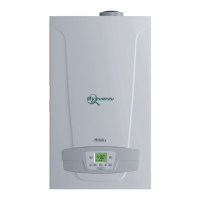


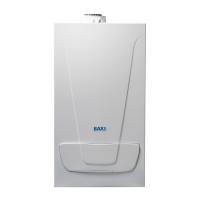
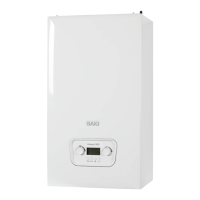


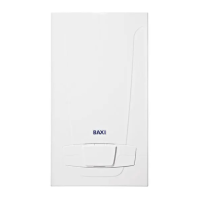


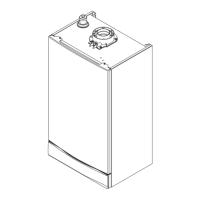
